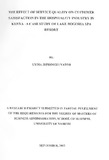| dc.description.abstract | In the wake of globalization, every sector in the economy is now facing new challenges, the greatest of which is has to contend with new competition emanating from various countries across the globe. The tourism sector, which is strongly linked to hospitality sector, is one of the industries which have been strongly affected by globalization. Thus with the increasing competition rises the need for strategies to create a competitive edge. The objective of this study is to examine the influence of service quality on customer satisfaction. The study utilizes a mixed methods approach where data is collected in two phases: the first phase is qualitative and exploratory in nature and utilizes an interview guide to collect the data. The data collected from phase 1 is then processed and used to create a structured questionnaire for phase two of the data collection. The first phase yielded five key variables for service quality namely: tangibles, reliability, responsiveness, assurance and empathy. These variables were then sent back to the respondents to rate multiple items under each variable on a five point likert scale. The resulting data was analyzed using descriptive statistics and Pearson correlation analysis, from the data analysis, it was found that service quality of the hotel was highly rated by the respondents. Each of the five major variables of service quality had a rating above 4 in the five point likert scale. This showed that the hotel was performing well in terms of quality of services offered. It was also found that service quality (as measured by each of the live variables) had a very strong correlation with customer satisfaction. Thus the study concluded that service quality has a very strong positive relationship with customer satisfaction. The study recommends that the hotel industry should pursue a more rigorous approach to fighting competition. It also recommends that the hotel should pay closer attention to service quality as it has a huge influence on customer satisfaction. The study
v
was limited in a number of ways. The key limitation was with regard to the population base of the study which was only Lake Bogoria SPA Resort. The fact that the study was based only on a single hotel could make the generalization of findings to the hotel industry in Kenya difficult. The second limitation had to do with the fact that the study did not compare the views of the employees on service quality with those of customers to establish whether there are any gaps. Thus from the limitations, it was recommended that future studies should base their research on a more inclusive population base that covers all hotel segments in Kenya. Additionally, it was recommended that future studies should attempt to establish the gap between employee perceptions and customer perceptions of service quality. | en_US |



